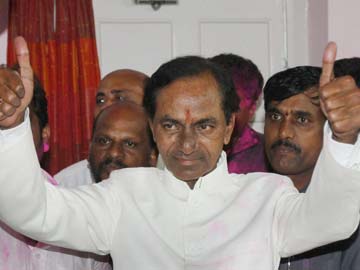 New Delhi/Hyderabad, Mar 4: On a day the Janata Dal (United) snubbed its alliance overtures, the Congress was dealt another blow on Monday when in the evening Telangana Rashtra Samithi (TRS) not only ruled out a merger but also indicated it was open to a tie-up with other political parties.
New Delhi/Hyderabad, Mar 4: On a day the Janata Dal (United) snubbed its alliance overtures, the Congress was dealt another blow on Monday when in the evening Telangana Rashtra Samithi (TRS) not only ruled out a merger but also indicated it was open to a tie-up with other political parties.
TRS chief K Chandrasekhar Rao announced in Hyderabad that his party had unanimously decided not to merge with the Congress. After a six-hour meeting of its general body, TRS also set up a five-member committee to discuss alliance with other parties, including the Congress.
The developments are a blow to the Congress’ Lok Sabha math. It braved opposition within and outside to go ahead with the Andhra split, expecting to reap rich electoral dividends in Telangana, which has 17 Lok Sabha seats, in alliance with TRS. With anger against the split, Seemandhra with 25 Lok Sabha seats is largely seen as a lost cause for the Congress.
TRS sources said the majority in the party favoured maintaining an independent identity and having a “level-playing field” with all parties. Another view was that the party should take a decision on tie-ups only after the elections.
Earlier in the day, JD(U) chief Sharad Yadav ruled out any tie-up with the Congress and said his party would work to strengthen the Third Front of 11 non-BJP, non-Congress parties. “We will strengthen that and spoil the game of the Congress and BJP,” he said.
In view of the Rashtriya Janata Dal (RJD) chief Lalu Prasad’s refusal to concede more than 11 seats to it in Bihar, the Congress opened back-channel talks with CM Nitish Kumar’s party. But the JD(U)’s demand for special status for Bihar remained the biggest stumbling block.
Read : Lalu relents on deadline to Cong, offers 11 LS seats
The JD(U) snub has now left the Congress with two options — to go it alone or accept Prasad’s offer. It has since scaled down its demand for seats from 15 to 12 seats. Bihar has 40 Lok Sabha seats.
Many JD(U) leaders viewed the Congress overtures as a tactic to build pressure on the RJD. The indication that the Congress was inching closer to finalising the deal with the RJD came from party
spokesman Abhishek Manu Singhvi. “We are moving in the direction that will be proper and effective for both the Congress and RJD,” he said.





Comments
Add new comment